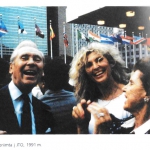News
As Lithuania celebrates its Independence on February 16th, it makes us reflect on its tumultuous history and analyze the events and consequences. After the 18th century under the Russian Empire and WWI turmoil, Lithuanian Independence declared in 1918 turned out to be only temporary, as Lithuania was occupied by the Soviet Union in 1940. However, its citizens across the globe never lost hope to get it back some day.
Lithuanian history textbooks have chapters on the events in Lithuania leading to regaining the Freedom in 1990, however chapters, yet to be written, must be added on the work done by Lithuanian diaspora. Dr. Joseph Kazickas and his family worked hard putting Lithuania's name back on the map during the Soviet occupation. His daughter, Jurate Kazickas, a reporter, writer, filmmaker and Lithuanian patriot, shared her perspective on the events in Lithuania with the American audience of The Washington Times on February 20, 1989:
Prologue to Freedom in Lithuania?
by Jurate Kazickas
Last week, for the first time in 50 years, the anniversary of the 1918 founding of an independent Lithuania was celebrated there as an official national holiday. In 1988, many demonstrators were detained and beaten, but in 1989, thousands gathered in town squares without fear and the once-outlawed yellow, green and red national flag was flying high.
The recent developments in Lithuania and its Baltic neighbors, Latvia and Estonia, are profoundly moving to those of us who lost our homelands in the Soviet occupation of 1940. It is almost impossible to grasp that Baltic citizens are openly demanding self-rule, economic independence and even a total break with the Soviet Union. Just as astonishing is the sight of a Soviet leader, Mikhail Gorbachev, actually tolerating some of these acts.
I was born in Lithuania at the height of the German-Russian war. My family was active in the anti-Communist underground during the first period of Russian occupation in 1940-41. Stalinist persecution was at its worst and we lived in daily fear of arrest and deportation to Siberia.
In July 1944, as the Russian army moved to recapture Vilnius, with their planes bombing German positions and artillery shells exploding, we escaped on horse-drawn wagons in the middle of the night. After three years of uncertainty in war-torn Germany, we found a new home in America.
Like all Lithuanian-Americans, I remain fiercely proud of my heritage. We Baltic immigrants have never lost hope that one day our homelands would be independent again. We have been particularly sustained by U.S. support, with every president from Franklin D. Roosevelt forward saying, as former President Reagan said last year: "We have never recognized the forcible incorporation of Lithuania into the Soviet Union and we never will."
The new surge of hope has been triggered by glasnost and perestroika. Mr. Gorbachev's new policies were conceived in an attempt to bolster the crumbling economic system. But in the Baltic countries, they have primarily served to reawaken powerful national feelings and hostility against Soviet authority.
Lithuanians and Estonians recently passed laws making their languages the official national languages. Estonians even passed a resolution giving their Parliament veto power over Soviet laws. The Catholic Church, historically at the forefront of the dissident movement in Lithuania, has seen its cathedral in Vilnius and some of its churches reopened for worship after decades of secular use.
These events have presented President Bush a historic opportunity. With peace and freedom on the march in Afghanistan, Angola and elsewhere around the world, a similar movement is advancing in the Baltic states.
Mr. Bush has said he wants to see evidence of Soviet progress on human rights before the 1991 Human Rights Conference in Moscow. There is no better test than that posed by the Baltic question.
Present events have demonstrated that the staunch U.S. refusal to recognize the Soviet annexation of the Baltic states should remain the centerpiece of America's Baltic policy.
It is now timely for Washington to ask Mr. Gorbachev directly to make public, once and for all, the long-denied Molotov-Ribbentrop non-aggression pact of 1939, with its secret protocol dividing eastern Europe into Soviet and German spheres of influence. This document is evidence that the Soviet Union planned to occupy the Baltic states by force even before the war broke out and that the annexation violated international law. It is the legal and moral basis of all Baltic claims to freedom and a return to independence.
Furthermore, it is crucial that Washington step up its public support of the principles of self-determination and the restoration of sovereignty to the Baltic states. Also, we hope that our government will work for the identification and release of political prisoners. Expansion of cultural, academic and economic exchanges between the United States and the Baltic states should be sought as well.
These goals are not impossible. The administration has obvious leverage with Moscow by, among other bargaining points, restricting high technology exports and delaying most-favored-nation status in trade until the issue of Baltic freedom is addressed.
Recently I visited with a member of Sajudis, the Lithuanian Reform Movement, and asked him what Baltic-Americans can do right now. "Just let everyone in America know what is happening in Lithuania," he said. "Gorbachev cares very much about world opinion. If you are on our side, freedom is possible."
The Baltic question is not one of ethnic rights, but of human rights.
Photo: Dr. Joseph, Alexandra and Jurate Kazickas in 1991 when Lithuania became a United Nations member

